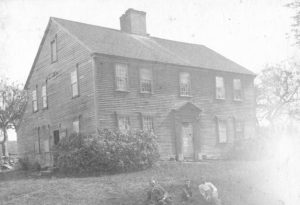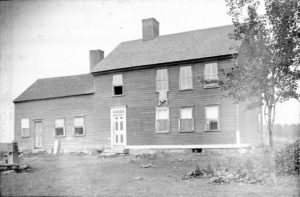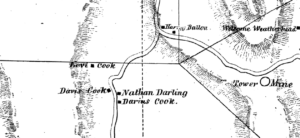Major William Ballou Tavern
Major William Ballou (1753-1839), son of Elder Abner Ballou, and grandson of Obadiah Ballou.

Location: Undetermined, but near the Elder Ballou Meeting House.
“The home of the above children of Maj. William Ballou was the country tavern built by the Major soon after the Revolutionary War near the “Ballou Meeting House.” Cumberland furnished her full proportion of offices and soldiers for the Revolutionary Army, who, when the war was over, were joined by others who had seen similar service, till there was quite a community of old veterans in this part of the town and this tavern was their favorite rendevous, where during the long winter evenings they held their reunions and received a soldier’s welcome.
Before the advent of railroads, these country inns filled an important place in every town. There were several in the town at this time, all well patronized and doing a prosperous business, viz. The Otis Mason tavern on Diamond Hill plain, Capt. Absalom Ballou house on the road to Providence, where the village of Ashton now stands, and many others, but perhaps there was none so widely known to the traveling community or so profitable to the proprietor as Cook’s Hotel on Cumberland Hill. It was no uncommon sight to find forty 4-horse teams hauled up for the night at this popular hotel. In the winter season, it was the central point for the sleighing parties, within a circuit of twenty miles, and few men of three-score and ten, in the same locality, but could give glowing descriptions of the dancing parties and turkey suppers furnished under the direction of Capt. Amos Cook and his sons, one of whom is the landlord at the present time of the last of the old country taverns.” [1]
Levi Cook Place
Possible identification: Col. Levi Cook (1773-1857)
(great-grandson of James Ballou)

Probable location on 1838 map: Levi Cook, just to the west of West Wrentham Road, south of the Elder Ballou Cemetery, Iron Rock Hill and the Preston Ballou House.

“Levi Cook was a handsome, portly man, of strong common sense and commanding abilities. He was Col. of Militia, often a prominent Town Councilman, and several times member of the State Legislature. He was an economical farmer on a homestead about a mile north of Cumberland Hill…”’ [2]
- Adin Ballou, “An Elaborate History”, p. 564
- “An Elaborate History”, p. 399.